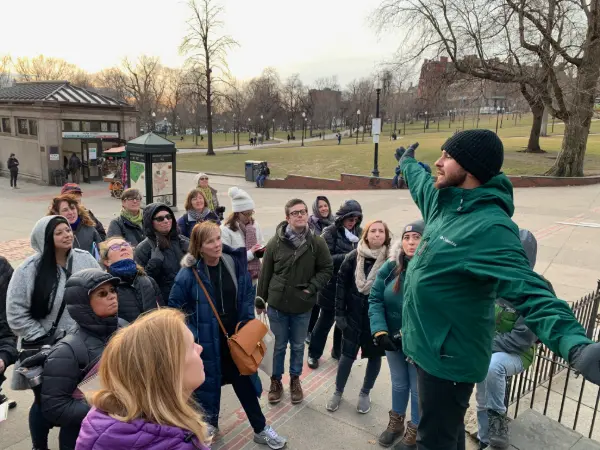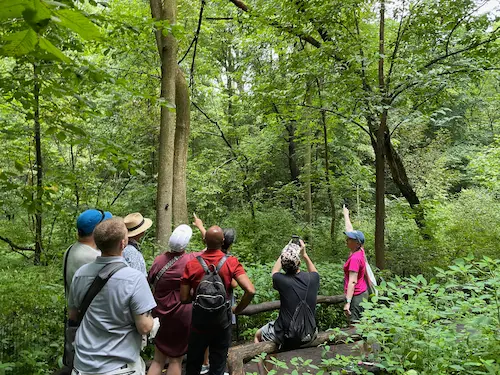
How to Become a Tour Guide
A step-by-step guide to becoming a tour guide and getting an job as an international tourist guide.
By Mitch Bach, co-founder of TripSchool
- Introduction
- Step 1 – Determine whether you actually want this job, and have the skills necessary.
- Step 2 – Determine what kind of guiding job you want.
- Step 3 – Get training and licenses, if necessary.
- Step 4 – Get a travel guide job! (Or start your own business)
- Step 5 – Start working, and never stop learning!
Introduction
The past couple of years have made so many of us rethink what we want our futures to be. Are you sick of an office, a boss breathing down your neck, and the endless monotony of a job that doesn’t challenge and inspire you? It might be time to think about a travel industry career, and becoming a tour guide is more exciting, engaging and interesting than you may think!
Guiding is exhilarating: you spend your days interacting out in the world with people excited to listen to you. And yet, annoyingly, it’s not a job that shows up on a career quiz, and so we all end up discovering it by accident. Perhaps you took a great tour and thought “hey! I could do this!” or you’ve worked an office job for a long time, and are ready to go into the non-cubicle world. We at TripSchool believe that guides are the face of the travel industry. They’re the people making your experiences come alive, and mean more. Looking at a destination through someone’s knowledgeable (and interesting) perspective, makes travel mean more, and your vacation more memorable.
So let’s dive in! You want to become an international tour guide. Do you need to take a tour guide training course? How much money will you make? How do you find work and get hired? We’ll answer all those questions and more.
It might be tempting to dive in and start searching for tour guide jobs, but it’s important to first understand how the industry works, and learn how to best get work as a tour guide, and whether an international tour guide certification course might be right for you.
So let’s take a moment and break down the job, and the process of becoming a tour guide!

A licensed city tour guide leads a walking tour on the streets of New York City.

A nature guide goes into the woods and helps travelers identify trees, plants and birds.
Step 1 – Determine whether you actually want this job, and have the skills necessary.
It’s easy to be seduced by the dream of being paid to travel, but the reality is a lot tougher. This is a job that rewards people who hustle, who are good at networking, and don’t mind the uncertainty of the gig economy.
While you’ll learn a lot on the job, you should make sure you have basic possession of the following skills, and a desire to improve and learn:
- Be a good communicator. Your voice and presence is your product. You can’t be soft-spoken and rambling, or your guests will be turned off from whatever you say.
- You have to be a bit of a performer. Travelers to a new destination want to feel emotions about a new place. You may be the world’s best historian, but you’ll still have to put on a bit of a show. Being a good storyteller on tour is different than simply explaining something in a classroom setting or telling a good yarn around the dinner table. You’ll want to be able to synthesize and structure what you know into entertaining, relevant tidbits.
- You should love knowledge and learning. Sure, there are some who do this job who memorize a script, and their five fun facts, and get away with it. But the most inspiring tour guides have a deep love of learning new information. You can tell when a guide knows more than just what they’re saying, and it’s incredible to watch a great guide weave everything they know into a customized story for their specific audience. We here at TripSchool have built our whole guide training program on the importance of lifelong learning.
- Have a customer service mindset. If you’ve worked in a restaurant, or hotel or somewhere that you are constantly dealing with all kinds of people, then you’ll be ready for this job. Employers love to see that you’ve worked in a customer service setting, because when it comes down to it, no amount of great knowledge will make up for treating guests rudely or with indifference. Remember, this is the trip of a lifetime for your travelers, so you can’t have a bad day.
- Always be organized and on time. You can’t show up 10 minutes late for a tour, and apologize to 25 people waiting for you. You can’t finish 45 minutes late and mess up guests’ dinner or theater plans! A tour should be what it is advertised to be, because it’s one part of your guests’ total vacation. So deliver it as stated, and your organization, accurate tour timing, and punctuality will be appreciated!
- Be flexible! You can be organized, but not so fine-tuned that when something unexpected happens, you’re thrown for a loop and react with anger or frustration. Stay positive, and know that guests are often late, or there might be someone who needs a restroom on tour even after saying there won’t be a comfort stop. All of that goes to the customer service aspect.
- Have energy. This speaks to the performance aspect of the job. Your job is to energize and excite people about wherever you’re showing them.
- Be a go-getter. You have to really get out there and put yourself forward. Network with others, be active in groups on social media. Attend conferences and join organizations. That’s how you get work in this industry. Not by loading up your web browser and sending off emails and resumes and waiting.
- Be a leader! You can’t let unruly guests ruin the whole experience, or let people talk over you or dictate the timing of the tour. A strong leader doesn’t look abrasive or dominating, but knows how to keep the ship on course!
- This is a lifestyle. Know what you want out of life, and whether you can take the job of a tour director that travels for weeks at end, or have the financial ability to weather a dry spell of not getting work. It’s a life that rewards constant hustling, and like an actor, you’re always thinking about new sources of revenue and possibly other companies to work for should the one you’re with go belly-up.
- Be a problem-solver. This isn’t a job where you wait for your boss to tell you what to do, or make a phone call to someone to have them fix an issue. On a short 3-hour tour, you’ll have to constantly be adjusting your schedule, responding to unexpected problems, and think through how you can proactively fix a situation. You’re constantly fixing issues yourself, and not hoping someone else will!
Step 2 – Determine what kind of guiding job you want.
Great. So you’re not turned off by all the hats you’ll have to wear, and skills you’ll need to develop. Next: you have to think about what kind of work you want to do. What are your interests and passions? What works with your life schedule? Do you want to travel to new destinations, or develop work in your hometown? There’s a lot to consider. Some of the more major and mainstream types of tour guides include:
- Walking Tour Guide – You’ll usually work in a city, need to know a lot of history, and take a group from stop to stop along the way. There are thousands of these companies (check out ExperienceFirst or Context Travel.)
- Motor Coach city guide – you’ll be on a motor coach (bus) usually with a microphone, narrating a drive through a city. (Citysightseeing operates their hop-on hop-off tours all over the world.)
- Museum Guide – you might work more as a “docent” in a museum, walking a group around and discussing art or natural history. (example: Babylon Tours).
- Adventure Guide – if your passion is the outdoors, then you might love tours that involve hiking through the national parks, or rafting in exotic locations (check out Intrepid Travel, leading these tours all around the world).
- Tour Director – this is a different kind of job altogether. While a standard tour guide is with a group for 3-8 hours and finishes at the end of the day, a tour director (or tour leader or manager or all sorts of other names) will be with a group of people over the course of days or even weeks. The chance to develop a bond with The tour director wears many different hats, and we’ve written an entire separate article to help you decide if tour directing is right for you!
All of these tours might be offered in different ways:
- Public Tours – these are usually larger groups, from 5 to 30 people (or more!), who come from around the world to take a tour together. They don’t know each other, they’ve all just purchased a tour from a company, and will spend only a few hours together.
- Private Tour – these are tours booked by a group of people that know each other, and want the exclusivity of knowing they won’t share the guide with anyone else. It could be a small family of 4 people, or a family reunion gathering of 40!
And finally, you might work in several different ways:
- Tour companies are known as tour operators. An operator may hire you to do regular work for them, on a semi-predictable schedule. You might be hired to lead Statue of Liberty tours for 4 days a week for the same tour operator.
- You might be hired for a specific tour. A company might need a guide, and call you up to lead just one tour. As a tour director, this might mean 10 days of work for you. But other day operators may only need you as a fill-in.
- You might work as an independent contractor (most common) or employee. It’s more expensive to put someone on the payroll with benefits, so usually you’re hired as an independent contractor, and have the right to accept or turn down work as you see fit. Remember that if you’re turning down too much work, you probably won’t be asked later! This also means you’ll pay self-employment tax on the income earned.
- Finally, you could run your own tour business. We teach a whole workshop on starting a tour business, since there is a LOT involved in doing this. It’s a highly competitive world, and you have to be ready to invest a lot of time and energy if you’re going to grow your own tour business. But it can also be one of the most rewarding experiences of your life; there’s nothing like being an entrepreneur, and realizing your future is in your own hands!
Step 3 – Get training and licenses, if necessary.
TripSchool is a training company, so we obviously believe deeply and passionately in the value of learning guiding skills in a training program. However, don’t let any prospective program fool you into thinking that you’re required to get some sort of certificate or certification before you can start doing your job. You don’t. TripSchool Co-founder Mitch Bach started his career in Paris, and was hired by a company while he was still in his first year of college. All he had was a good personality and love of history, and that began a career that would take him to dozens of countries around the world as a guide and tour director. But learning through experience is the hard way. We started TripSchool to give you all the experience and wisdom we’ve accrued over decades in one package, giving you a leg up on the competition. Check out our Tour Guide Boot Camp class here.
Do you need a license? That’s another story. The short answer is: maybe. You have to decide where you’re guiding, first. And then search for the license requirements for that region. New York City requires you to pass a knowledge test (we wrote a whole article here!). Cities across Europe (especially Italy) regulate tour guiding very seriously and may require years of course-taking before you can legally guide. Other cities like Washington, D.C. require a license but don’t make you pass a test. And many cities have no licensing requirements at all.
Step 4 – Get a travel guide job! (Or start your own business)
So you’ve decided to pursue this job. You know the sector you want to work in. You’ve done your homework, you’ve got your licenses or training done, and now it’s time to get hired and work!
Firstly, the tourism industry is enormous. The worldwide market is estimated in the trillions of dollars, and the tours and activities sector in the United States alone is measure in the hundreds of billions. There are millions of tour guides out there, so you’re part of a very large sector of the industry.
Getting Hired by another company
If you’re going to go down the road of getting hired by a tour company, here are some tips:
- First and foremost, get over being shy. You need to reach out to people and ask for advice, help, even just information on the industry in your region. We here at TripSchool have been leading and creating tours for 20+ years… and by and large we find people willing to help and share what they’ve learned.
- Make Google your day job! Search your heart out, covering all the bases of companies in your region that are operating tours (googling “tour companies in Ireland” gives you a blog with a nice list!).
- Contact your local CVB/DMO: these are the acronyms for a local organization that works on courting business to a city or region. A Convention and Visitors Bureau (CVB) or Destination Management Organization (DMO, the new, more modern name), are often staffed by people whose job it is to be friendly and help people in the local tourism market out. Call them up!
- Join your local tour guide guild. Tour Guide Guilds are non-profit associations in existence purely to support tour guides in an area or region. TripSchool is industry partners with these guilds, like the Guides Association of New York City and the Guild of Professional Tour Guides of Washington, D.C., which offer amazing amounts of professional development seminars, networking events, and annual hiring fairs. If you don’t know if there’s a guild near you, check out (another partner of ours) the National Federation of Tourist Guide Associations (NFTGA) or the WFTGA if you’re not in the U.S.
- Look at other conferences and events! We’re big fans of the annual IATDG Conference and Arival. These conferences bring together hundreds of tour directors and guides and tour operators, and the mingling is invaluable.
Start your own business
We discussed this already in the last section, but starting your own business is a great idea IF you’re willing to put in the work, and the idea of being an entrepreneur excites you. If you want to put in long days, you’re ok with the uncertainty of whether your business will succeed, and are creative and passionate about building your own brand, then go for it! A great way to start is our Start a Tour Business Workshop, but many guides only start to go down this road after they’ve spent a few years learning the ropes and how the industry works.
Step 5 – Start working, and never stop learning!
Being a guide is not a “get trained and be done” kind of job. It requires a constant thirst for acquiring new skills and knowledge. The more you know, the more tours you’ve developed and led, the more you’re valuable to future employers. So always keep reading, take other tours, and get out there and discover your own secrets of where you live! Guests today love being shown hidden gems and places only locals know about. So be endlessly curious about what’s new in your city, and even develop relationships with store owners and restaurants, so you might be able to offer your tour guests an “insider take” on a destination. The more you know, and the more relationships you have with others in this industry, the more you’ll succeed. It’s that simple. And hard!
Get our E-Book: Refresh & Reinvigorate Your Tours!
Become a tour guide today!
TripSchool is the global leader in tour guide education, with over 3,000 graduates of our online and in-person programs. Explore our certification and skills classes, and get started on your new tour guide career!

